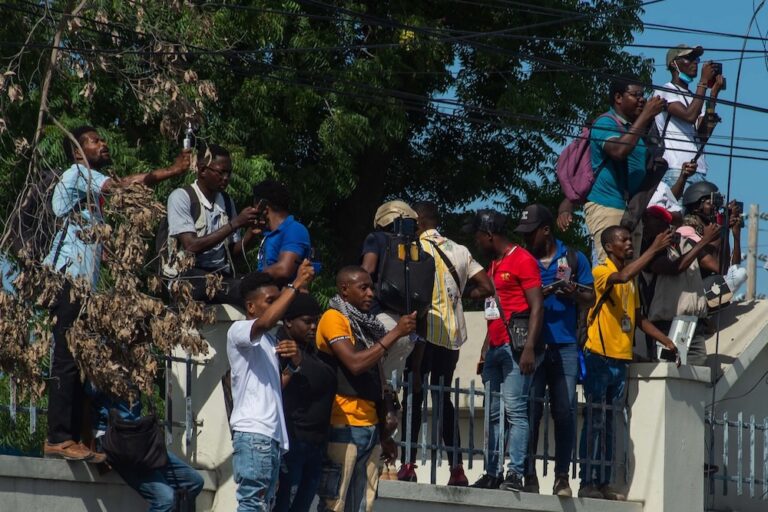(CPJ/IFEX) – The following is a 15 August 2003 CPJ press release: HAITI: Officials agree to review CPJ press freedom cases Port-au-Prince, August 15, 2003–Top officials of the government of President Jean-Bertrand Aristide have agreed to report to the Committee to Protect Journalists (CPJ) on the status of judicial investigations into press freedom abuses documented […]
(CPJ/IFEX) – The following is a 15 August 2003 CPJ press release:
HAITI: Officials agree to review CPJ press freedom cases
Port-au-Prince, August 15, 2003–Top officials of the government of President Jean-Bertrand Aristide have agreed to report to the Committee to Protect Journalists (CPJ) on the status of judicial investigations into press freedom abuses documented by CPJ.
The agreement came during a five-day visit to Haiti by members of a CPJ delegation, who met with journalists from state and private media, as well as with government officials, to discuss press freedom concerns in Haiti.
Violence and threats of violence against journalists have fostered a climate of fear and intimidation, according to many of the journalists who spoke with the CPJ delegation. The killings of two Haitian journalists in recent years, the flight of dozens of others into exile, as well as ongoing attacks against those still working in the country, have made Haiti one of the most violent places to practice journalism in the western hemisphere, second only to Colombia, according to CPJ research.
In a meeting with the CPJ delegation on Wednesday, Prime Minister Yvon Neptune agreed to review a listing of cases documented by CPJ and to send a response within a month. On the same day, Minister of Justice and Public Security Calixte Delatour said he will report to CPJ within two weeks on the status of the investigation into the murder of Michèle Montas’ bodyguard on December 25, 2002. The murder took place during what was widely viewed as an assassination attempt against Haitian journalist Montas, whose husband Jean Dominique was gunned down in 2000 outside the radio station that they operated together in Port-au-Prince. The station, Radio Haiti-Inter, is now closed and Montas is living in exile in the United States.
Asked about the Jean Dominique case in a Thursday meeting with CPJ, President Aristide said “it’s time for them [Jean Dominique’s family] to see justice.” While some arrests have been made in this case, the investigation has been widely criticized and many Haitians believe that those who ordered Dominique’s murder have not been charged. Of Montas’ exile, Aristide said, “She was working and doing a good job. Unfortunately she had to leave.” The president said he would like to see Montas return. “We need her, Haiti needs her,” he said.
The CPJ delegation was led by executive director Ann Cooper and Americas program coordinator Carlos Lauría. Joining them were three CPJ board members: Franz Allina; Clarence Page, the Pulitzer Prize-winning columnist for the Chicago Tribune; and Paul Tash, editor and president of The St. Petersburg Times, the largest daily newspaper in Florida.
Asked about the climate of fear that Montas and other journalists said have driven them into exile, Aristide said, “I take seriously what some journalists say when they say they fear for their lives.” The president questioned the veracity of some journalists’ claims, but said “sometimes we have to pay attention.”
During several days of fact-finding, the CPJ delegation heard from a variety of journalists. Many charged that the government in fact does not act to stop pressures and intimidation from the government and its supporters in Haiti’s so-called “popular organizations.” Pressures cited by journalists ranged from death threats to physical attacks to politically motivated tax inspections. Impunity in press freedom abuses ? in particular the murders of Jean Dominique and Brignol Lindor, a Haitian journalist hacked to death with machetes in 2001 ? helps foster the climate of violence in which journalists currently work.
CPJ is particularly concerned about these ongoing abuses in light of the government’s announcement this week that legislative elections will be held in November. In Haiti’s currently deeply polarized political situation, the likelihood of continuing violence against journalists remains high. In a 2002 statement, President Aristide told journalists that “I will do everything in my power so that journalists can do their jobs without interference.” CPJ calls upon the president and his government to live up to that promise, and urges the government to adopt the following recommendations:
* The Haitian government is responsible for the security of all people, including members of the media who are frequently threatened with violence, physically attacked, or even murdered while performing their work, or in reprisal for what they broadcast or write. When journalists are not able to report free of such threats, all of society suffers from lack of information and lack of open discourse on matters of public interest. We therefore call on the Haitian government to speak out firmly in favor of press freedom, and to act strongly to ensure the security of Haitian journalists, by preventing acts of aggression and intimidation, and by thoroughly investigating attacks on journalists and bringing those responsible to justice.
* Of particular urgency are the investigations into the murders of Jean Dominique, assassinated by gunmen more than three years ago in 2000, and Brignol Lindor, who was hacked to death by machete in December 2001. After years of delay, a strong push by the government for impartial and exhaustive investigations into each of these murders, and the prosecutions of those who ordered and carried them out, would send a powerful message to Haitian society ? and to Haitian journalists ? that such actions will not be tolerated. In addition, the government must protect persons involved in these investigations and legal proceedings, in order to ensure they are able to pursue the truth without threat.
* Another key step toward ending the violence and intimidation against journalists is to stop the impunity enjoyed by those who continue to attack journalists. To that end, CPJ has asked the government to open a dialogue about outstanding cases: CPJ will present the government with a list of cases from recent years in which journalists have been attacked or killed for their work, and we ask the government to respond within 30 days, citing the status of investigations in each case.
* In addition to these investigations, the government must make clear to Haitian society that there will be no tolerance of acts of violence and intimidation against journalists. We strongly urge the government to control and disarm so-called “popular organizations” that clearly operate outside the law, promoting violence and attacking citizens, including journalists.
For more information about press freedom conditions in Haiti, visit www.cpj.org.


